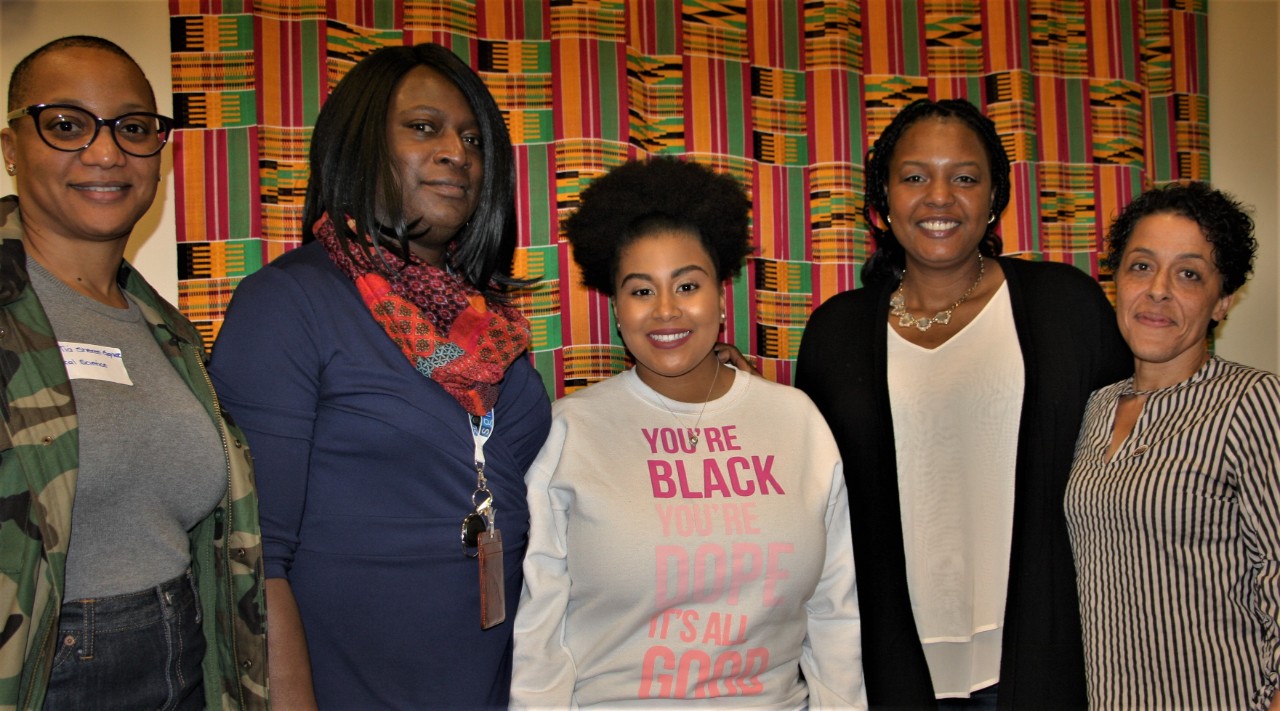
Photos: Cincinnati Project celebrates fifth-annual symposium
UC students, staff, faculty and community come together to focus on the health and well being of women of color
Photos and story by John(na) Jackson
The Cincinnati Project hosted its fifth-annual social justice symposium March 1 at the University of Cincinnati's African American Cultural and Resource Center.
Students and scholars from around the Greater Cincinnati community devoted the day to lifting the voices and promoting the needs of local women of color, discussing their unique struggles while exploring strategies for achieving equality.
Organized by project director Jennifer Malat, Tia Gaynor, an assistant professor of political science, and project coordinator Curtis Webb III, the day included four panels on the experiences of women of color in Cincinnati.
A research organization designed to advance social change through research projects vital to Cincinnati's neighborhoods and residents, TCP has grown to include more than 350 UC Arts & Sciences' faculty and students, and more than 30 community organizations.
According to Gaynor, the symposium, "provides space for the university to partner with and learn from community members doing amazing equity and justice work. Events like this reduce barriers that many perceive exist between UC and the community in which it is located."

Curtis L. Webb III, graduate assistant and project coordinator for TCP, introduces the panel: Objectivity and Scholar Activist Work. Faculty members Ann Steinart (history), Anjali Dutt (psychology), Emily Houh (law) and Zhuo Ban (communication) discussed the ethics involved in conducting social justice research, and best practices for navigating normative expectations around objectivity.

The first panel of the day, moderated by Littisha Bates (associate sociology professor, affiliate Africana studies faculty), was named Strengthening Connections through Equity Work.

Anne Runyan (middle right) and Jack Mewhirter (right) of political science shared recent findings on gendered and racialized wage inequality gathered by the Cincinnati Convention on the Elimination of all Forms of Discrimination Against Women (CEDAW). Kelly Gusweiler (middle left) representing the UC Foundation presented her social media campaign project focused on advocacy for low-income communities. Psychology doctoral student, Erica Page (left), finished the panel by sharing the ways her academic department has supported her professional development in advancing performing arts literacy initiatives among youth with the local non-profit Learning Through Art.

Alice Deters and Alicia Boards (psychology) share details of the National Institutes of Health (NIH) funded programming they helped develop in a panel titled Community-Partnered Research for Change: From First Meeting to Policy. Their research involves bringing together high school students from diverse backgrounds to tackle the unique ways they experience the negative impacts of the opioid epidemic, while learning the ropes of the community-partnered research approach.

The symposium was organized in the main lounge of the African American Cultural and Resource Center and included panel discussions with visual presentation materials. Symposium attendees were able to direct questions to speakers during the panels, with time to meet-and-greet afterward.
Such events allow us to get outside of our academic disciplinary space to examine issues holistically and through varying lenses. We get to see, perhaps an issue we have been discussing, through perspectives that might be very different than our own. This is particularly important in an academic environment because we are given the space to challenge ourselves and grow through interdisciplinary exploration.
Tia Gaynor

Newly appointed director of the Social Justice Master's of Public Administration degree program, Brandi Blessett (center), is joined by two graduate researchers, Elaina Johns-Wolfe (left) and Alice Deters. Johns-Wolfe, a doctoral candidate in sociology, completed research to explore how a lack of affordable housing contributes to issues such as neighborhood poverty and racial residential segregation. Her findings instigated the creation of an eviction prevention program by the city council, with coffers exceeding $400,000 to help those in need of rent during a financial crisis.

Keynote panelist Jessica Roach (left) and Kimberly McGinnis, assistant adjunct professor at UC (right), pose with renowned feminist scholar and 2017 TCP keynote speaker Patricia Hill Collins (center).

The keynote panel, titled A Call to Action by Women of Color Activists, was moderated by Tia Gaynor and featured (from left to right): Brittany Bibb of the Irate8, Arykah Carter from TransOhio, Mona Jenkins of Mass Action for Black Liberation (MABL) and Jessica Roach from Restoring Our Own Through Transformation (ROOTT). Panelists discussed their personal activist work, sharing their strategies for engaging in successful activist campaigns.
Related Stories
Love it or raze it?
February 20, 2026
An architectural magazine covered the demolition of UC's Crosley Tower.
From research to resume: Grad Career Week prepares students for career paths
February 20, 2026
Graduate students at the University of Cincinnati will explore how their academic and creative work translates into professional success during Grad Career Week, March 2–6, a week-long series of workshops, networking opportunities, and skill-building sessions hosted by the Graduate College.
Social media linked to student loneliness
February 20, 2026
Inside Higher Education highlighted a new study by the University of Cincinnati that found that college students across the country who spent more time on social media reported feeling more loneliness.
